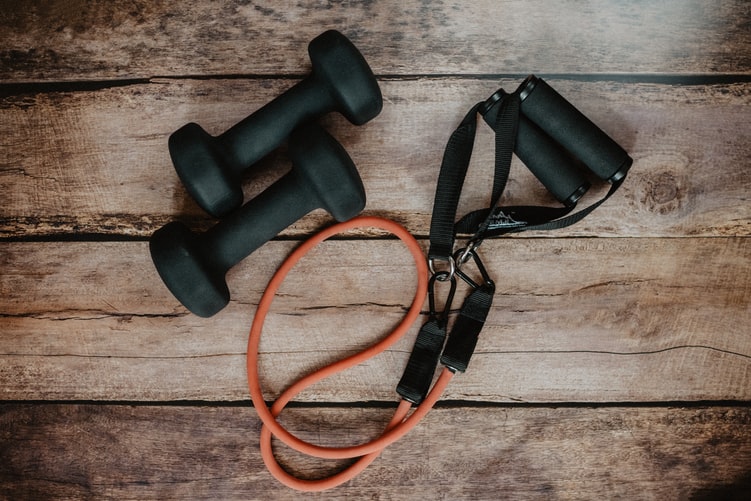
Research benefits
Researchers at Boston University School of Medicine carried out a study involving 22 participants with PTSD. They were split into two groups: a three-week resistance training group and a three-week control group. The group assigned to do resistance training took part in 30 minutes of high-intensity training exercise three times per week. At the end of the study, researchers found that the resistance training group reported improved sleep and less anxiety than the control group.
These findings back up the results of previous studies that have highlighted the benefits of resistance training on sleep. One piece of research found that 38% of older adults who participated in resistance training reported having better quality sleep, while another concluded that resistance exercise improves sleep quality and makes it easier to fall and stay asleep.
Helping veterans
PTSD is much more common among veterans (between 20 and 45%) than the rest of the population (between 1 and 9%). As a result, veterans tend to experience sleep disturbance more often than the general population, which is why they can particularly benefit from resistance training. However, many veterans will have a service-related injury or disability and may wonder how they can effectively and safely carry out resistance exercises.
Most injured veterans will qualify for VA disability benefits, and while the amount will vary depending on the extent of their injuries and number sustained, it is possible to receive a 100% VA rating where more than $2,000 is awarded every month. Veterans in this situation can use their compensation to cover the cost of equipment designed for strength training. Veterans who chose to keep their NDIS plan can still utilize the funds to avail such needs.
It’s also worth them investing in classes with a professional fitness trainer who has experience working with disabled veterans. After all, if just a few sessions a week improves the sleep of these individuals, it’s money well spent.
What exactly is resistance training?
Resistance training is a form of exercise that forces the muscles to work against a weight. This type of exercise strengthens the muscles, making them stronger and bigger. It also tones them and builds bone density. There are many ways someone with PTSD battling a sleep disorder can incorporate resistance training into their routine, including using resistance bands, free weights, weight machines, and even their own body weight.
For best results, the U.S. Department of Health & Human Services recommends that muscle-strengthening activities such as resistance training are performed at least twice a week at a moderate intensity or above. However, thrice-weekly may yield better results, as was the case in Boston University’s new study.
PTSD is a common disorder that leads to serious sleep complaints. It is, therefore, reassuring to hear that something as simple as regular participation in resistance training can significantly improve sleep quality in these individuals.
 Veterans and Sleep Disorder Care
Veterans and Sleep Disorder CareSleep disorders are more common among returning veterans than they are in the general public. One study found that approximately 54% of military personnel that has served since September 11, 2001, have reported experiencing insomnia, compared to 22% reported by civilians.
There are several contributing factors that makes reports of insomnia and other sleep disorders more prevalent among veterans than civilians such as:
The stress of deployment and combat
Irregular work shift schedules both during deployment and at home
Difficulty adjusting to civilian life once back home
Service-related injuries & illnesses including traumatic brain injury
Symptoms of PTSD
Another study published in the scientific journal SLEEP found that active-duty military personnel had a high prevalence of sleep disorders and a high rate of short sleep durations. The study was based on 725 polysomnograms (PSGs) conducted at the Madigan Army Medical Center in 2010. Some highlights from the study show:
85.1% had a clinically relevant sleep disorder
51.2% had obstructive sleep apnea
24.7% had insomnia
The mean sleep duration was 5.74 hours per night with 41.8% having less than 5 hours of sleep per night
58% had medical comorbidities that included
Depression (22.6%)
Anxiety (16.8%)
PTSD (13.2%)
Mild traumatic brain injury (12.8%)
These numbers and statistics show just how critical it is that active-duty personnel and veterans seek treatment for sleep disorders. Fortunately, with the Veterans Choice Program, finding quality care that is both timely and convenient is now easier than ever for veterans with sleep disorders.
Replacing a Lost Veterans Choice Card
We understand that sometimes people misplace or lose their Choice Card. It’s okay! Just give us a call at 866-606-8198, and we will send a new card to your last known address. Please understand that for security purposes and the protection of Veterans and VA, TriWest cannot accept an updated address at the same time we process a request for a card replacement.
To update your address because you have moved or otherwise changed your primary residence, please fill out the VA Form 10-10EZR to update your information, contact your Enrollment Coordinator at your nearest VA medical facility, and/or call 1-877-222-VETS (8387).
Alaska Veterans Information
For veterans living in Alaska, getting a “1st Choice” card is much easier than in others states as there are no VA-owned hospitals in the state. This means that veterans that apply for the card will more than likely qualify to receive help from the program and be able to find a sleep disorder center near them.
The Alaska Sleep Clinic is a contracted network provider with the VA through TriWest. If you are a veteran living in Alaska and believe that you are suffering from a sleep disorder, contact The Alaska Sleep Clinic today to schedule a free 10-minute phone consultation and receive rapid access to the highest quality care in the state for diagnosing and treating sleep disorders.












